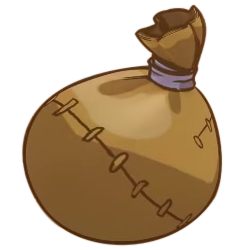Like “does the Pope shit in the woods?” or “that train has sailed?”
Also, what good examples can you think of?
When referring to a difficult task: “That’s a tough road to hold”, or “a tough road to hoe”, or “a tough road to [travel on]” or “a tough road to… [trails off awkwardly…]”, or just “a tough road”.
It’s a tough row to hoe.
It’s an agricultural metaphor. The row is a line of dirt in a field where you plant seeds. You use a hoe to dig the lines, remove weeds, and create little holes where you drop the seeds. Hoeing may be difficult if the soil is too hard or too full of rocks and weeds. Such a row would be a tough one to hoe.
I understand how you got there, but it sounds like a tough hoe to plow.
I thought most hoes would be quite easy to plow
All the more reason to emphasize the tough ones!
Also, have you SEEN inflation lately?!?!?
I like ‘bob’s your oyster’ because both original phrases are nonsensical to me. Is there a word isometric to portmanteau but for phrases / idioms?
“The blood of the covenant is thicker than the water of the womb.” Meaning contracts, friendships, and keeping promises should take priority over family loyalty.
Now changed to “Blood is thicker than water” and means the exact opposite of the original.
Get two birds stoned at once
I like, “get two birds stoned with one bush” as some bastard amalgamation of “kill two birds with one stone” and “a bird in the hand is worth two in the bush”
Two stones with one bird
It’s not rocket surgery.
“I could care less”
You could and you should!
We’ll drive off that bridge when we get to it
I usually go with “We’ll burn that bridge when we get to it”
That’s my favorite one to use
No, the bridge is too well-guarded.
I can’t believe you got such a simple saying wrong. It’s not rocket surgery.
I need to start using this one, I already use “burn that bridge” fairly often
I like “we’ll burn that bridge when we come to it”
How the hell should I know, I’m not a rocket surgeon
I’m a rocket sturgeon
Sounds fishy
Now, that one does have its place. I either it in an ironic sense that you dont need multiple degrees to do something. The flip side is that the people we send to space tend to be the most qualified people in multiple fields, a medical surgeon with a stem degree does not sound too far outside the realm of reason.
Arguably, a mechanic who is literally performing maintenance on exceptionally mechanically dense and complex parts of a rocket, say the rocket engine plumbing or wiring harnesses… is figuratively performing rocket surgery.
Or, taking a different perspective:
https://pubmed.ncbi.nlm.nih.gov/1433409/
Management of trauma and emergency surgery in space
As on Earth, the major determinant of emergency surgical care in spaceflight may be the presence or absence of a well-trained surgeon.
Sounds like they need a rocket surgeon!
Don’t throw the baby out with the bathwater else you’ll end up with a wet, critically injured baby.
Maybe also egg corn?
https://m.youtube.com/watch?v=F12LSAbos7A&t=467s&pp=ygULTWFsYXByb3Bpc20%3D
Good pull. Malapropism has always been one of my favorite words and comedic devices, so this is good info. Bravo!
Now if you’ll excuse me, I’m gonna go read an article about the Women’s Lubrication movement and eat my hot astronomy on rye.
If you haven’t, you might want to read Patrick O’Brien’s Aubrey/Maturin series, or at least to peruse this list from Reddit: https://www.reddit.com/r/AubreyMaturinSeries/comments/4ak12q/which_its_a_prodigious_great_list_of_aubreys/
See also as related:
https://en.wikipedia.org/wiki/Mondegreen
A mondegreen (/ˈmɒndɪˌɡriːn/ ⓘ) is a mishearing or misinterpretation of a phrase in a way that gives it a new meaning.[1] Mondegreens are most often created by a person listening to a poem or a song; the listener, being unable to hear a lyric clearly, substitutes words that sound similar and make some kind of sense.[2][3] The American writer Sylvia Wright coined the term in 1954, recalling a childhood memory of her mother reading the Scottish ballad “The Bonnie Earl o’ Moray”, and mishearing the words “laid him on the green” as “Lady Mondegreen”.
and
https://en.wikipedia.org/wiki/Malapropism
A malapropism (/ˈmæləprɒpɪzəm/; also called a malaprop, acyrologia, or Dogberryism) is the incorrect use of a word in place of a word with a similar sound, either unintentionally or for comedic effect, resulting in a nonsensical, often humorous utterance. An example is the statement attributed to baseball player Yogi Berra, regarding switch hitters, “He hits from both sides of the plate. He’s amphibious”,[1] with the accidental use of amphibious rather than the intended ambidextrous. Malapropisms often occur as errors in natural speech and are sometimes the subject of media attention, especially when made by politicians or other prominent individuals.
Though this is not for idiomatic phrases, there’s also misnomer, for when something is named in a misleading or inappropriate manner.
Though, different dictionaries seem to give different scope to what can and cannot be considered a misnomer, and others place different emphasis on precisely how the name is wrong qualifies it as a misnomer.
Cambridge lists ‘dry cleaning’ as an example, a process that involves liquid and is thus antithetical.
The focus is on something being named such that the obvious, plain reading of it implies the precise opposite.
Merriam Webster lists that its a misnomer to call a farmer a peasant, which is not antithetical but more along the lines of being rude, out of date.
Their conception of it is fairly broad: any name that is inaccurate for basically any reason.
Dictionary.com uses the examples of Chinese Checkers, a funny bone, and hay fever.
They focus the definition on the factual/historical inaccuracy of the term:
Chinese Checkers, did not originate in China, a funny bone is actually a nerve, not a bone, and hay fever is not caused by hay, nor is it a fever.
Cambridge lists ‘dry cleaning’ as an example, a process that involves liquid and is thus antithetical.
Ehhh…man, I dunno about that example, Cambridge. Like, wouldn’t sweeping involve cleaning something? Vacuuming?
That’s not “Dry cleaning”
No, but if they’re going to assert that cleaning involves liquid, they would be counterexamples to such an assertion.
“dry cleaning” is a specific term for a method of laundering clothes that DOES require a liquid, but not soaking the clothes in water.
Those things you mentioned are not counter examples, because they have nothing to do with “dry cleaning”.
That’s like if I point out that peanuts aren’t actually nuts, and you respond with “but walnuts are nuts!”
Yeah, walnuts are nuts, but that doesn’t have anything to do with peanuts and whether or not they are nuts.
They are focusing on the dry part of the term. Using a liquid during the process goes against the dry part.
I would tend to disagree with the Cambridge example, because liquids can be dry. “Dry” liquids are anhydrous, meaning they’ve been treated to remove any water.
Source: Am chemist and I teach O-Chem, which frequently uses dry solvents, like anhydrous acetone.
Bone apple tea!
“I’m lost for words”
Current pet peeve: “to step foot on”. Facepalm! Just coz somebody misheard “set” doesn’t make “step foot” grammatical. And yet here we are.
One of my standbys is “that horse has sailed”.
So, lots of examples, but not much on your question about terminology. In looking around a bit, I couldn’t find a single specific term for a malapropism that “sticks,” but you could fairly describe it as a form semantic drift driven by catachresis, thought the latter seems more common in literary criticism or philosophy than in linguistics.
catachresis
Ha! Here you are answering the actual question but nobody cares!
Amazing. I had never seen this word before.
Even then, I can’t quite find a single Linguistics term for this phenomenon, where it becomes a thing of its own or even replaces the original. ‘Eggcorn’ and ‘Malaphor’ seem to be pretty decent casual terms.











